In the post-Oslo era, reading Palestine through prisoners’ writings resembles reading an electrocardiography report. It does reflect the state of the “national body,” yet it requires a painful confrontation with our collective memory and amnesia. The writings of Walid Daqqa, a “masked philosopher” who is currently spending his 34th year in Zionist captivity, provide an ideal instance for such an exercise.
At the end of a rare phone call from Ramon Prison, Daqqa struck me with his take on the slaves’ role in philosophy. He believes in the possibility of separating the corporal from the intellectual, yet he views the passive agency of slaves in serving philosophers to be as crucial as the latter’s labor. Daqqa explains that in Zionist captivity, the case is reversed: the Israeli “guards” live their own form of slavery, not only in the awful machine of their settler colonial regime but also in “serving’” Palestinian prisoners, “enabling” them to own their indigenous time at the threshold between the individual “parallel time” and the communal “social time.”
Based on original prison notebooks, this article interrogates Daqqa’s intellectualism in captivity and reframes the dynamics that enabled prisoners to defy colonizing their indigenous time. In addition, it revisits the positionality of producing knowledge in captivity to bring an end to the lingering “parallel time” towards future and freedom.
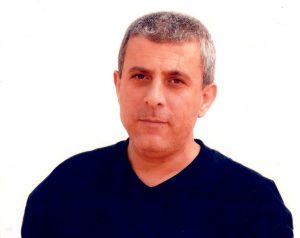
A liminal biography
Walid Daqqa was born in 1961 in Baqah al-Gharbiyyah, central Palestine. During his childhood, he lived the abnormalities of the liminal life between a colonized Arab village, suffering the ongoing torments of military defeat, and Tel Aviv, the triumphant center of the Israeli colony. In 1983, this harsh reality triggered in him the urge to join the Popular Front for the Liberation of Palestine (PFLP). On March 25, 1986, Daqqa was captured and sentenced to life in prison on the grounds of kidnapping an Israeli soldier as collateral to free Palestinian prisoners. In 2012, his sentence was set at 37 years. The Zionist authorities refused to release Daqqa in prisoner-exchange deals, and two years were wrongfully added to his sentence in 2018 on the grounds that he helped his fellow prisoners communicate with their families.
In addition to his key role in leading the Palestinian prisoners’ movement, Daqqa is an earnest public intellectual who “smuggles out” his (Arabic and Hebrew) writings, which subsequently appear in various venues that include Haaretz, Fasl al-Maqal, Bawabat al-Hadaf, and other media outlets affiliated with the National Democratic Assembly (BALAD), of which he became a member after 20 years in the PFLP. Daqqa is a prolific writer whose intellectual production includes highly sophisticated writings at the intersection of politics, philosophy, and literature. Much of his work is inspired by his passionate advocacy for the Palestinian cause.
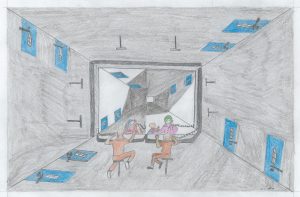
Against all odds, Daqqa managed to obtain an education in captivity. By 2010, he had finished both his BA and MA degrees in democracy studies from The Open University of Israel, and a parallel degree in regional studies in 2016 from Al-Quds University. Currently, he is pursuing his PhD in philosophy under the mentorship of Anat Matar from Tel Aviv University.
Daqqa demonstrates an encyclopedic knowledge of Arab sources, both medieval and modern, which he uses with precision against European traditions in philosophy. His masterful interweaving of diverse intellectual histories in his academic enterprise has no equal among his peers.
He seems like a manifestation of the philosopher’s “intellectual destroyer of evidence and universalities, the one who, in the inertias and constraints of the present, locates and marks the weak points, the openings, the lines of force, who continuously displaces himself, doesn’t know exactly where he is heading nor what he’ll think tomorrow because he is too attentive to the present.”
In 1996, the journalist and translator Sana’ Salamah met Walid during a visit to prisoners on behalf of the Association of Prisoners’ Supporters. The couple decided to get married in August 1999. After a year-long waiting period, the wedding ceremony took place in Askalan Prison with a limited number of attendees from their families and fellow prisoners. Sana’ and Walid were deprived of conjugal visits or even artificial insemination to conceive a child. For two decades, the couple have been meeting at the wire and glass barrier and talking via phone during bimonthly prison visits. Daqqa wasn’t only deprived of intimacy with his wife (Sana’) and fulfilling his desire to father a child (whom he would wish to call Milad), he was also banned from taking part in the funeral of his father (Nimer), and from hugging his mother (Fareeda), who has Alzheimer’s, during her last visit in 2019.
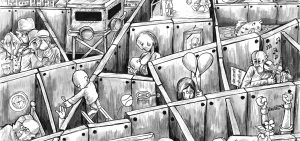
A turbulent odyssey
Perceiving writing as a political act, Daqqa has devoted much of his energy to discussing the fate of Palestinians within the green line (occupied Palestine in 1948) from their own perspective. Specifically, after taking part in the armed struggle waged by the PLO based on the Palestinian Charter of 1968, they were then left to face their fate alone, without a political guardian, in the post-Oslo era. His dictum of “parallel consciousness” started to emerge as a valuable tool to interrogate the political realities that led to the tragic prostration of Palestinian national foundations from “armed struggle” to a “struggle against arms.” Parallel consciousness is Daqqa’s way of describing time, space, and the human within the boundaries of 1948 in general, and in captivity, in particular. While Israel tried its best to render Palestinian freedom fighters as outlaws, the PA transformed them into social outcasts in dire need of “rehabilitation.” When the PLO abandoned its “principles,” and the national project that drowned in the Oslo illusion, the ongoing Nakba intensified, especially for those kept in double captivity: the prisoners from 1948 Palestine.
Daqqa’s intellectualism is focused on four topics: the assumed failure of revolutionary violence as a strategy of liberation; the Palestinian prisoners’ movement; criticizing the politics of the PLO towards the Palestinian Arabs of 1948; and questioning the political performance of the Palestinians of 1948 within the confines of Israeli fascism and the paradox of the “national law” that tried to collapse the contradictions within the settler nation between the so-called Israeli “Jewishness” and its “democracy.”
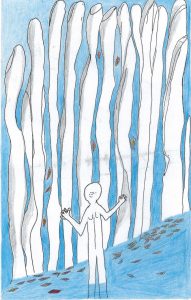
In his first book, Diaries of Resistance in Jenin Camp 2002 (2004), Daqqa conceptualizes Palestinian political ill-time. Drawing from several in-depth interviews that Daqqa conducted with his fellow prisoners who participated in battle (some of which appeared in Hebrew by Amira Hass), he focused on four interviews as he skillfully maneuvered between the historical event and its historiographical value as a political force to change reality. Ethnographically reflecting on his political affiliation between the PFLP and BALAD, Daqqa investigated the “case” of the Palestinians of 1948, and the absence of a strategic vision within the Palestinian establishment towards them. Searching for national salvation, Daqqa maintains that armed struggle was not a “wrong” strategy, but a “wronged” one throughout the history of the PLO.
Zooming in towards the impact of the unimaginative leaps by the PLO, Daqqa went a step further in investigating the transformations within the Palestinian prisoners’ movement. In his most prominent book, Consciousness Molded or the Re-Identification of Palestinian Torture (2010), Daqqa investigates technologies utilized by Israel to “sear” prisoners’ consciousness and to mold it anew in order to tame their morale. He takes prisoners as a case study, by which Israel examines its colonial psychological, social, and political engineering on the Palestinian people in the wider prison – within historical Palestine.
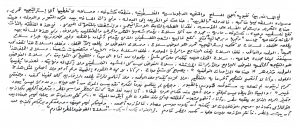
“Bettering” the material conditions of Palestinian prisoners, according to Daqqa, was not cost free, for “the prisoner’s body is no longer the direct target: the spirit and mind are.” Near the end of Al-Aqsa Intifada, around 2004, he argues, “Israel has created a strict system, based on the most updated theories of human engineering and social psychology, in order to mold Palestinian consciousness by shattering its collective values.” Such policies made prisons a replica of the segregated and thoroughly controlled OPT, and the prisoners lab mice for the experiments of taming Palestinians on the narrow borderline between life and death.
Living such realities, according to Daqqa and his fellow captives, wasn’t only an ontological experience, it was also a philosophical reality of living in the “parallel time” – a concept coined by Daqqa to depict life in prison juxtaposed to “social time” experienced on the “outside.” The concept appeared in three literary forms written between 2005 and 2014. The Letter of Parallel Time (2005) and the lyrical play The Story of Parallel Time (2011), both written in Gilboa Prison, and the theatrical play The Story of the Forgotten in the Parallel Time (2014), written in Hadarim Prison and produced in cooperation with Al-Maidan Theater in Haifa. All were warmly welcomed by the Palestinians but caused huge controversy and state animosity by Israelis.
Commemorating the 20th anniversary of his imprisonment, Daqqa wrote a letter expressing prisoners’ bitter dismay. From the time of the Cold War to Al-Aqsa Intifada, Palestinian prisoners have been cut off from the external world, while countless inventions have been introduced to life to which they don’t relate. Tubeless tires are among those inventions that Daqqa uses as a parody of politicians who steer Palestinian life in a rusted vehicle. Alas, don’t waste a chance to step on nails without having the courtesy of self-repair. Palestinian prisoners live a unique situation that is unmatched throughout the world: prisoners who have a ministry without a state.

Daqqa concedes: “We are part of a history, and history obviously is a state of past events that have ended; except for us, it is a continuous past that never ends. We communicate with you from it as a present that shouldn’t be your future. Our time is different from yours, for time here does not pace itself on the axis of past, present, and future. Our time, which flows in the lingering place, dropped the concepts of conventional time and space from our language, or it con-fused them, if you wish. Here, we don’t ask when and where we shall meet, for example, for we have met and keep meeting at the same place. Here, we travel at ease, back and forth, on the axis of the past and present, and every moment, post the present moment, is an unknown future that we are not capable of dealing with. We have no control over our future, and our case is quite similar to that of all Arab peoples. Yet there is a substantial difference: our occupation is foreign and theirs is Arab. Here we are in captivity because we search for a future, while their future has been buried alive.”
In 2011, Daqqa met the young Syrian musician Fida’ al-Sha’er from Majdal Shams, the occupied Golan Heights. Daqqa and Fida’ managed to manufacture an oud after a tiring journey; alas, the musical instrument was confiscated by the prison authorities. However, the story triggered a lyrical play that Daqqa wrote to depict prisoner life during Al-Aqsa Intifada, including scenes of a hunger strike and the martyrdom of a prisoner. In 2014, Bashar Murkus of Al-Maidan Theater altered the play to narrate the story of the playwright himself.
Preoccupied with the desire to father a child, denied conjugal visits, and facing titanic difficulties in “liberating” semen for artificial insemination, Daqqa decided to write a children’s story that reverses the whole course of events. In 2017, he released the first part of a trilogy for children: The Oil’s Secret Tale, followed by two manuscripts: The Sword’s Secret Tale (2018), and The Spirit’s Secret Tale (2019). The three stories, consecutively, narrate the lives of prisoners, refugees, and martyrs who inhabit marginalized geographies, albeit present in popular rhetoric, almost absent from the Palestinian establishment’s official discourse.
Since its launch in September 2018, The Oil’s Secret Tale has achieved wide acclaim throughout Palestine and won the Sharjah Award for Children’s Literature in 2018. This story also caused a huge controversy in Israel, where several events to celebrate the book and author were banned. Upon its publication, a related audio recording by Daqqa was circulated, explaining the aim of writing the story and allowing Joud, the 6-year-old protagonist who came into the world through artificial insemination, to triumph over the Zionist state by visiting his father:
“Prison is not the only thing that holds us captive with its walls and barbed wire. If you ask me the most important conclusion I’ve arrived at throughout the three decades I spent in captivity, I would say that we lost Palestine not because we are weak, but because we are weak and divided due to ignorance. Ignorance is our most furious enemy, it’s more dangerous than prisons, as it transforms your mind into a prison cell in which your future and the future of generations to come are held captive. My motive in writing The Oil’s Secret Tale was not creative writing but rather sumud (steadfastness) in captivity, for sumud was not possible throughout these long years, without liberating my mind from its prison cell, little by little. As much as I yearn for liberation from prison, I yearn for ‘liberating’ prison from myself. What caused me the most pain is that through my captivity I ‘lived’ with the grandfather, the father, and the son, and I recognized a scenario that keeps repeating itself, as if captivity is inherited. Therefore, I wanted Joud to emerge from The Oil’s Secret Tale against all odds, and to pace a path that does not lead to prison. I wanted him to think of a future that is different from ours. I wanted to release the imagination for these generations in order to be released from the scenarios that have been scripted for us and that we have scripted for the next generations, and a whole nation that entered captivity. I write to release myself from prison, with a hope to release it from myself.”
The writings of Walid Daqqa are not only a rich example of revolutionary poetics but also a philosophical trial in demonstration of the popular politics of hope in the heavy presence of hapless official Palestinian politics.


